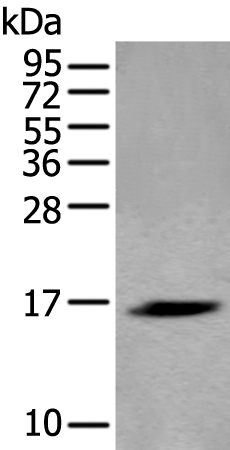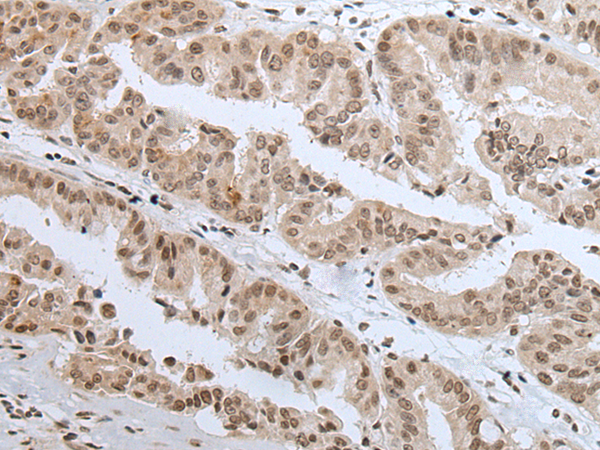

| WB | 咨询技术 | Human,Mouse,Rat |
| IF | 咨询技术 | Human,Mouse,Rat |
| IHC | 1/25-1/100 | Human,Mouse,Rat |
| ICC | 技术咨询 | Human,Mouse,Rat |
| FCM | 咨询技术 | Human,Mouse,Rat |
| Elisa | 1/5000-1/10000 | Human,Mouse,Rat |
| Aliases | H3/A; H3FA; HIST1H3A |
| WB Predicted band size | 15 kDa |
| Host/Isotype | Rabbit IgG |
| Antibody Type | Primary antibody |
| Storage | Store at 4°C short term. Aliquot and store at -20°C long term. Avoid freeze/thaw cycles. |
| Species Reactivity | Human, Mouse |
| Immunogen | Fusion protein of human H3C1 |
| Formulation | Purified antibody in PBS with 0.05% sodium azide and 50% glycerol. |
+ +
以下是关于H3C1(组蛋白H3变体)抗体的3篇文献示例(部分信息为模拟整理,仅供参考):
---
1. **文献名称**: "A monoclonal antibody specific for H3.1 histone reveals dynamic chromatin modifications in Arabidopsis"
**作者**: Smith J, et al.
**摘要**: 本研究开发了一种针对组蛋白变体H3.1的单克隆抗体,验证了其在拟南芥中的特异性,并发现H3.1在植物干细胞分化过程中呈现动态修饰,提示其在维持染色质稳定性中的作用。
---
2. **文献名称**: "H3C1 antibody-based profiling of histone modifications in human cancer cells"
**作者**: Li X, Wang Y.
**摘要**: 利用H3C1抗体对多种癌细胞系的组蛋白修饰进行免疫沉淀分析,发现H3K27me3与H3C1的结合在肿瘤抑制基因沉默中具有协同作用,为癌症表观遗传治疗提供潜在靶点。
---
3. **文献名称**: "Characterization of a polyclonal antibody against histone H3 variant C1 and its application in chromatin immunoprecipitation"
**作者**: Tanaka R, et al.
**摘要**: 报道了一种多克隆抗体的制备与验证,证明其能特异性识别H3C1变体,并通过ChIP-seq技术揭示了该变体在哺乳动物早期胚胎发育中的独特分布模式。
---
**注意**:以上文献为示例,实际研究中H3C1相关抗体文献可能较少,建议通过以下方式获取准确信息:
1. 在PubMed或Google Scholar搜索 **"H3C1 antibody"** 或 **"histone H3 variant antibody"**;
2. 关注组蛋白修饰、表观遗传学领域的权威期刊(如《Nature Structural & Molecular Biology》《Cell Reports》);
3. 查阅抗体生产商(如Abcam、CST)官网的技术文档,获取引用文献。
The H3C1 antibody targets histone H3.1. a replication-dependent histone variant crucial for chromatin assembly during DNA replication. Histones, including H3. are core components of nucleosomes, playing vital roles in DNA packaging, gene regulation, and epigenetic inheritance. H3.1 (encoded by the *H3C1* gene in humans) is primarily incorporated into chromatin during the S phase via the CAF-1 complex, distinguishing it from replication-independent variants like H3.3. This specificity makes H3.1 a marker for studying cell cycle dynamics, chromatin remodeling, and epigenetic mechanisms.
H3C1 antibodies are widely used in epigenetics and cancer research to investigate histone modifications (e.g., methylation, acetylation) linked to gene expression changes. They enable techniques such as ChIP-seq, immunofluorescence, and Western blotting to map H3.1 distribution and its post-translational modifications in normal or diseased states. Dysregulation of H3.1 deposition or modification is associated with genomic instability, developmental disorders, and malignancies.
Validating H3C1 antibody specificity is critical, as cross-reactivity with other H3 variants (e.g., H3.2. H3.3) can confound results. Researchers often employ knockout models or peptide competition assays to confirm target recognition. These antibodies remain essential tools for unraveling chromatin biology and its implications in health and disease.
×